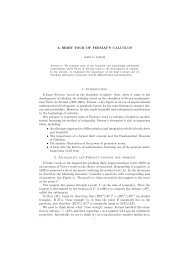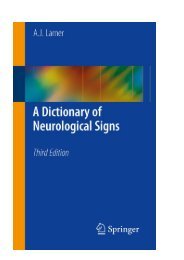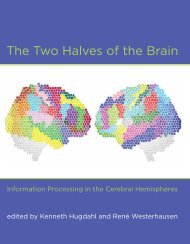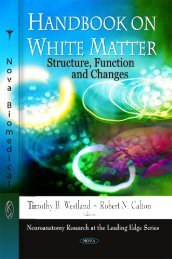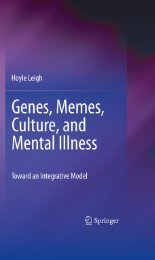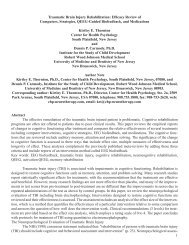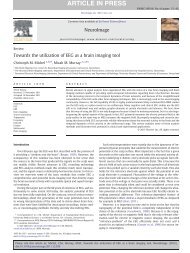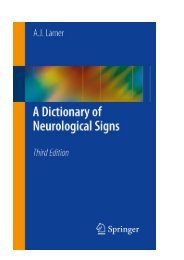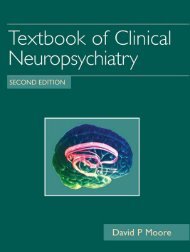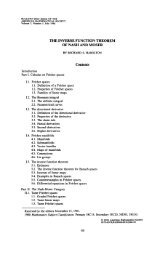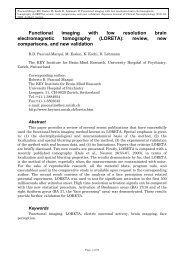Brain Development: Normal Processes and the Effects of Alcohol ...
Brain Development: Normal Processes and the Effects of Alcohol ...
Brain Development: Normal Processes and the Effects of Alcohol ...
- TAGS
- processes
- www.brainm.com
You also want an ePaper? Increase the reach of your titles
YUMPU automatically turns print PDFs into web optimized ePapers that Google loves.
132 ETHANOL-AFFECTE D DEVELOPMENT<br />
et al, 1996; Kerns étal, 1997 ; Schonfel d étal, 2001;<br />
Willford e t al, 2004). A longitudinal follow-u p study<br />
<strong>of</strong> 14-year-olds shows that verbal-auditory ra<strong>the</strong> r than<br />
visuospatial memor y i s affected wit h learning ; short -<br />
<strong>and</strong> long-ter m memor y deficits on a paired associate<br />
task are detected (Willfor d et al, 2004) . I n a sampl e<br />
<strong>of</strong> adolescents an d youn g adult s classifie d a s having<br />
an "averag e IQ " o r "belo w averag e IQ, " Kern s an d<br />
colleagues (1997 ) show that individuals with FAS perform<br />
belo w expectation o n <strong>the</strong> CVLT-C. The greates t<br />
difference i s not o n initia l learning trials, but o n th e<br />
fifth trial. These results suggest that affected individu -<br />
als are not able to use semantic memory strategies appropriately<br />
t o maintain a comparable learnin g slop e<br />
over repeated trials . That is, <strong>the</strong> individual s with FAS<br />
do not use <strong>the</strong> categorie s inheren t i n <strong>the</strong> lists to organize<br />
<strong>and</strong> facilitate <strong>the</strong>ir recal l an d <strong>the</strong>i r response s do<br />
not sho w <strong>the</strong> clusterin g o f semantically related item s<br />
that is usually found i f effective memor y strategies are<br />
used. This findin g contrast s t o a lack <strong>of</strong> difference i n<br />
primacy effec t an d seria l clustering scores , which re -<br />
lies less on strategy use.<br />
Mattson an d Riley (1999) contras t intentional an d<br />
incidental memor y b y measuring recal l o f information<br />
(a ) whe n childre n wit h FA S ar e awar e o f th e<br />
memory tas k involved <strong>and</strong> (b ) when <strong>the</strong> y learn infor -<br />
mation usin g effective memor y strategies provided by<br />
<strong>the</strong> investigator s without bein g awar e <strong>of</strong> <strong>the</strong> nee d t o<br />
learn <strong>the</strong> information in expectation o f recall. The in -<br />
vestigators conclude tha t incidental memor y is not affected<br />
b y prenatal alcohol exposure.<br />
Coles an d colleague s (1997 ) gav e a n alcohol -<br />
exposed an d a contras t grou p o f 7-year-olds a paire d<br />
associate tas k requirin g tha t th e childre n continu e<br />
with <strong>the</strong> list-learnin g process until <strong>the</strong> y achiev e mas -<br />
tery. At both immediat e an d delaye d recall , alcohol -<br />
affected childre n ar e no t differen t fro m control s with<br />
this methodology . Th e numbe r o f repetition s re -<br />
quired t o achiev e lis t mastery , however , i s signifi -<br />
cantly higher for alcohol-affected children .<br />
Cumulatively, <strong>the</strong> abov e findings suggest that one<br />
aspect o f th e memor y defici t observe d i n alcohol -<br />
affected individual s involves employing strategies. That<br />
is, <strong>the</strong>y may not be exhibiting effective "metarnemory "<br />
(an important aspect <strong>of</strong> executive functioning) in tha t<br />
<strong>the</strong>y ma y hav e mor e difficult y i n selectin g an d em -<br />
ploying effective learnin g strategies <strong>and</strong> <strong>the</strong> y may not<br />
be aware <strong>of</strong> <strong>the</strong> level <strong>of</strong> effort required t o achieve mas -<br />
tery on a particular task. It may also be tha t becaus e<br />
alcohol-affected individual s process informatio n mor e<br />
slowly, learning time is spent less efficiently an d mor e<br />
trials are required. Whe<strong>the</strong>r <strong>the</strong>se deficit s are uniqu e<br />
to individuals with FAS D o r are characteristic <strong>of</strong> slow<br />
learners in general i s not clear <strong>and</strong> should b e <strong>the</strong> sub -<br />
ject <strong>of</strong> fur<strong>the</strong>r study .<br />
An aspect <strong>of</strong> memory that is considered a factor in<br />
executive processin g i s active working memory. This<br />
process involve s menta l manipulatio n o f element s<br />
stored briefl y i n short-term memor y <strong>and</strong> has been referred<br />
to as a "mental scratc h pad " (Ashcraft , 1995) . It<br />
requires that informatio n be store d an d processe d i n<br />
meaningful "units " at a given moment in time. Man y<br />
<strong>of</strong> <strong>the</strong> cognitiv e task s comprising neurodevelopnien -<br />
tal tes t batterie s includ e us e o f active working mem -<br />
ory because higher-order processing or problem solving<br />
requires tha t severa l unit s o f informatio n b e main -<br />
tained simultaneously .<br />
In alcohol-affected individuals , problems i n active<br />
working memor y hav e bee n identifie d earl y i n in -<br />
fancy. Usin g a visua l expectanc y paradig m (Hait h<br />
et al. , 1988 ; Jacobson e t al. , 1992 ) as a measur e o f<br />
working memory, Was s <strong>and</strong> Hait h (1999 ) show that 3month-old<br />
infants exposed to alcohol prenatally have<br />
more difficult y tha n nonexpose d control s i n main -<br />
taining an d manipulatin g three item s <strong>of</strong> information<br />
simultaneously, a result implying a reduction i n working<br />
memory capacity . On th e same task, <strong>the</strong>se infant s<br />
have difficultie s shiftin g fro m on e rul e t o ano<strong>the</strong> r<br />
(that is , learning to anticipate wher e item s woul d b e<br />
presented next ) an d wit h masterin g comple x spatia l<br />
sequences. Kodituwakk u an d colleague s (1995 ) use d<br />
several neurodevelopmental tasks tapping activ e working<br />
memory in older individuals. They conclude that a<br />
problem i n managing goal s i n working memory i s <strong>the</strong><br />
mechanism underlyin g much o f <strong>the</strong> cognitiv e impairment<br />
see n i n childre n wit h FAS . I n practica l terms ,<br />
such a defici t wil l affec t dail y functionin g an d academic<br />
performanc e a s well a s results <strong>of</strong> neuropsychological<br />
tests. For instance, children diagnosed with FAS<br />
consistently sho w impairment s i n doing ma<strong>the</strong>matics ,<br />
as demonstrate d b y performanc e o n th e arithmeti c<br />
subtests from <strong>the</strong> Wechsler series (e.g., Wechsler, 1991)<br />
<strong>of</strong> intelligence tests . These tests rel y heavily on activ e<br />
working memor y skill s by requiring <strong>the</strong> manipulatio n<br />
<strong>of</strong> number s an d arithmeti c operation s i n short-ter m<br />
memory to generate correct answers .<br />
Planning an d Organization . Peopl e wit h FAS D<br />
are described a s having impairments in planning, organization,<br />
an d problem-solvin g aspect s o f executiv e




